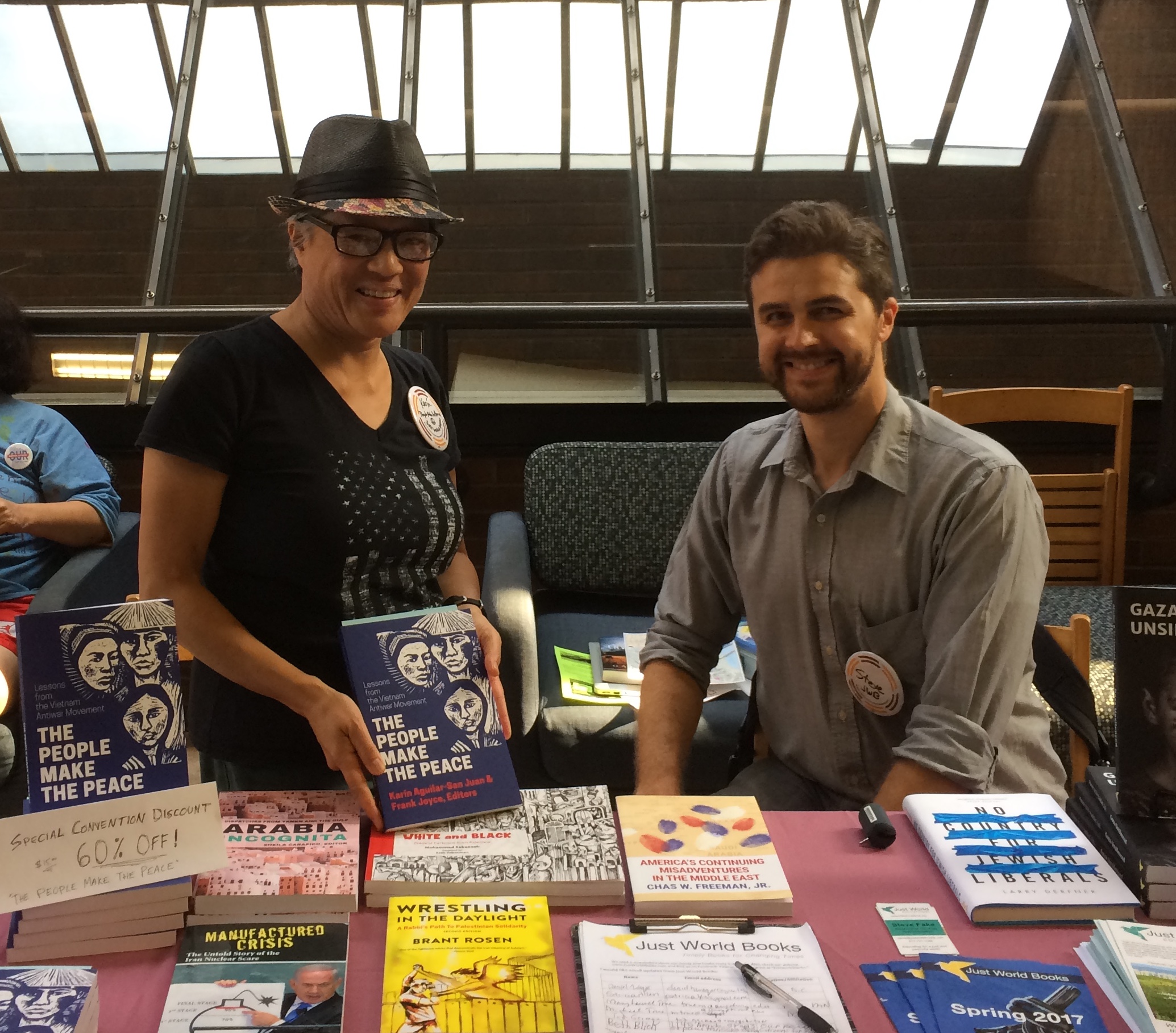In early August, Just World Educational’s Steve Fake met with Karín Aguilar-San Juan in Minneapolis to record our most recent podcast. Aguilar-San Juan is an associate professor of American Studies at Macalester College. Her book Little Saigons: Staying Vietnamese in America (U. of Minnesota, 2009) examined the role of place for Vietnamese Americans.
Together with Frank Joyce, she co-edited The People Make the Peace: Lessons from the Vietnam Antiwar Movement (Just World Books 2015) featuring reflections by prominent U.S. antiwar activists and an interview with five U.S. ex-combat veterans now living in Viet Nam. The book was featured on CSPAN3 and formed the basis of an antiwar symposium at Macalester College and the East Side Freedom Library.
In the conversation that follows, Aguilar-San Juan discusses what led to the creation of the book, the peace movement against the Vietnam War, and how it is now being memorialized by the Pentagon and in Ken Burns and Lynn Novick’s prominent new documentary on PBS. As she points out, the book is a corrective to the shallow depictions that the antiwar movement tends to receive. It focuses in on the antiwar movement and the difficult, complex decisions young people had to make.
Co-editor Frank Joyce contributed to the discussion surrounding Burn’s documentary with an op-ed in the Detroit Free Press. For Joyce, “the series seemed designed to leave viewers overwhelmed, depressed and disempowered.”
Find your non-Communist friends
The genesis of the book came from the year of discussions between (eventual contributor) John McAuliff and Frank Joyce and Aguilar-San Juan (who would become the editors), talking about the roughly two hundred Americans who travelled as emissaries of peace to Vietnam.
It was a sort of travel-study circuit of American dissidents touring Vietnam during the war. Aguilar-San Juan draws an interesting comparison with the contemporary movements for Palestine which encourage international solidarity through foreign delegations. Many of the participants in these peace trips were or would become prominent, including Jane Fonda, Gabriel Kolko, Tom Hayden, Herbert Aptheker, and Staughton Lynd. The North Vietnamese officials told the American visitors to return to the U.S. “find your non-Communist friends.”
Some of these individuals joined a return trip in 2013 to commemorate the 1973 Paris Peace Accords.
Karín Aguilar-San Juan on the “Forrest Gump-ified” memory of the Vietnam War
Karín laments what she calls a “Forrest Gump-ified” understanding that young people especially have of the War and the peace movement against it.
She notes the ongoing impact of the peace movement. For decades after the war, the so-called “Vietnam Syndrome” limited U.S. willingness to deploy large numbers of troops in foreign military conflicts.
Aguilar-San Juan praises a 1967 French antiwar documentary film — Far from Vietnam (Loin du Vietnam) — that emerged from France’s cinematic New Wave period and included the participation of Jean-Luc Godard among others and featured Vietnamese voices.
Above all, Karín highlights the impact and prosaic heroism of the people’s movement of citizen diplomacy. As she puts it, these activists didn’t join the movement because they knew they would win, they joined because they thought it was necessary and important. In a real sense, it was citizen diplomacy, hundreds of U.S. citizens came at the invitation of the Vietnamese government, including movement celebrities and artists like Joan Baez and Susan Sontag.
From The Student Nonviolent Coordinating Committee to the peace movement
It is not often remembered that there were substantial links between the Civil Rights Movement and the Vietnam anti-war movement. Many SNCC alumni went on to be leaders in the antiwar movement. In a sense, the earlier movement was an incubator for the peace movement.
Later in the discussion, Aguilar-San Juan discusses the Pentagon’s Vietnam War memorialization efforts, and touches upon the new Ken Burns documentary. “The antiwar movement is hardly recognized for its role in ending the war,” she observes. “This is a model for the present for ending wars.” Karín calls it “the most massive movement against war in the history of the United States,” quoting her co-editor, Frank Joyce.
Aguilar-San Juan closes on an inspiring note: “It’s really important for millennials to hear [of the successes of the Vietnam antiwar movement] because millennials grew up in war. They were born in war, they are in war now, they have no time when they have seen the U.S. not be at war. It’s important for them to see people their own age took great risks… they challenged their parents… and devoted their lives to ending war. It’s kind of unbelievable. I think it can really change people in terms of what they think is possible.”

